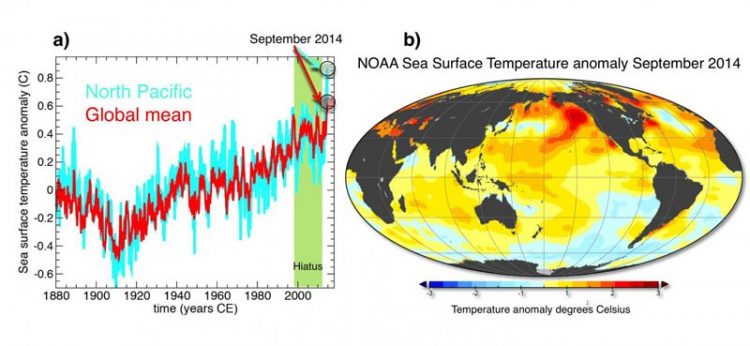Warmest oceans ever recorded

Figure 1: a) NOAA Sea Surface Temperature anomaly (with respect to period 1854-2013) averaged over global oceans (red) and over North Pacific (0-60oN, 110oE-100oW) (cyan). September 2014 temperatures broke the record for both global and North Pacific Sea Surface Temperatures. b) Sea Surface Temperature anomaly of September 2014 from NOAA's ERSST dataset. Credit: Axel Timmermann
From 2000-2013 the global ocean surface temperature rise paused, in spite of increasing greenhouse gas concentrations. This period, referred to as the Global Warming Hiatus, raised a lot of public and scientific interest.
However, as of April 2014 ocean warming has picked up speed again, according to Timmermann's analysis of ocean temperature datasets.
“The 2014 global ocean warming is mostly due to the North Pacific, which has warmed far beyond any recorded value (Figure 1a) and has shifted hurricane tracks, weakened trade winds, and produced coral bleaching in the Hawaiian Islands,” explains Timmermann.
He describes the events leading up to this upswing as follows: Sea-surface temperatures started to rise unusually quickly in the extratropical North Pacific already in January 2014.
A few months later, in April and May, westerly winds pushed a huge amount of very warm water usually stored in the western Pacific along the equator to the eastern Pacific.
This warm water has spread along the North American Pacific coast, releasing into the atmosphere enormous amounts of heat–heat that had been locked up in the Western tropical Pacific for nearly a decade.
“Record-breaking greenhouse gas concentrations and anomalously weak North Pacific summer trade winds, which usually cool the ocean surface, have contributed further to the rise in sea surface temperatures.
The warm temperatures now extend in a wide swath from just north of Papua New Guinea to the Gulf of Alaska (Figure 1b),” says Timmermann.
The current record-breaking temperatures indicate that the 14-year-long pause in ocean warming has come to an end.
Media Contact
More Information:
http://www.hawaii.eduAll latest news from the category: Earth Sciences
Earth Sciences (also referred to as Geosciences), which deals with basic issues surrounding our planet, plays a vital role in the area of energy and raw materials supply.
Earth Sciences comprises subjects such as geology, geography, geological informatics, paleontology, mineralogy, petrography, crystallography, geophysics, geodesy, glaciology, cartography, photogrammetry, meteorology and seismology, early-warning systems, earthquake research and polar research.
Newest articles

Properties of new materials for microchips
… can now be measured well. Reseachers of Delft University of Technology demonstrated measuring performance properties of ultrathin silicon membranes. Making ever smaller and more powerful chips requires new ultrathin…

Floating solar’s potential
… to support sustainable development by addressing climate, water, and energy goals holistically. A new study published this week in Nature Energy raises the potential for floating solar photovoltaics (FPV)…

Skyrmions move at record speeds
… a step towards the computing of the future. An international research team led by scientists from the CNRS1 has discovered that the magnetic nanobubbles2 known as skyrmions can be…




















